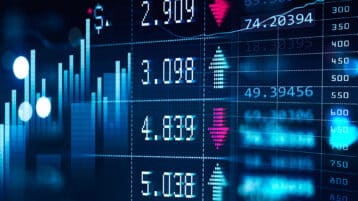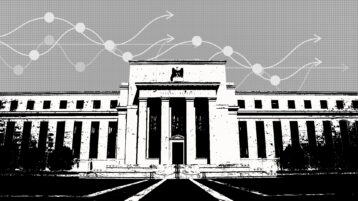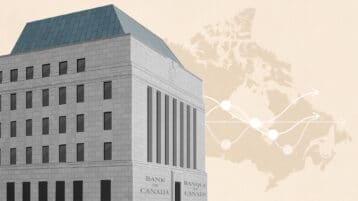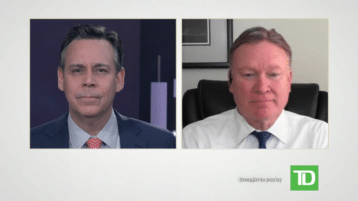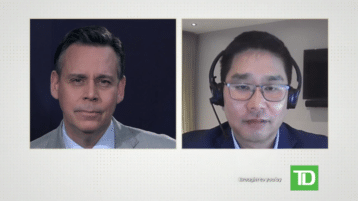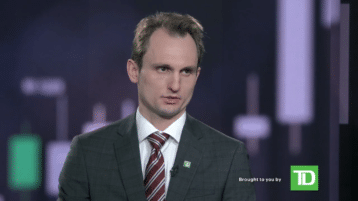Print Transcript
[theme music] [theme music] >> Hello, I'm Greg Bonnell. It welcome to MoneyTalk Live, brought to you by TD Direct Investing. It's a new program broadcast daily on WebBroker. Every day, I will be joined by guests, many of whom you will only see here. I will take you through what's moving at the market and answer questions about investing. Coming up on today's show, we will discuss how potential recession would hit the commodity sector and why oil may hold up better than you think. It Bart Melek, head of commodity strategy at TD securities is going to join us. In today's WebBroker education segment, no arena will take you through some tools to analyse investments. Here's how to get in touch with us. Email moneytalklive@td.com or you can fill out thebox below this video player. Let's update you on the markets. It a mixed session. We want to start at home with the TSX Composite Index, down to the tune of about 156 points, seen weakness in some of the big energy names and materials, financials not helping us along today. Let's take a look at Corus entertainment. We got some news out of this shop, 10 bucks and $0.48 a share,it's down more than 3%. Across the border, the S&P 500, the broader read of the market, we are hearing from central bankers about an ECB event, Jerome Powell getting theheadline so far. Another update on how the first quarter fared in the United States. There was a contraction in growth. You have soaring inflation on the other side of that. These accommodations we don't want to see as investors, and combinations that the central bankers don't want to see either. Let's check out the tech heavy NASDAQ 100. That's in positive territory. A mixed day right now, and indecisive day on the North American markets. Now is take a look at carnival cruises, some concerns on the street about the cruise business going forward. Some of those shares on the space under pressure, carnival, eight bucks and $0.98, is down 13%. That's your market update. Recession risk it, something that's increasingly on the minds of investors and while slow down growth would hit commodities, our featured guest says that downturned prices would be short-lived in oil might do better than we think. Joining us now, Bart Melek, and of commodity strategy at TD security. Great to have you. Let's jump in. There are fears, we are hearing it from central bankers to, that they need to tame inflation and that could lead to recession. If we got there, what's the follow for commodity? > First of all, wonderful to be here. Commodities, I think, like all other risk assets will seal a material slow down in economic activity, mainly because that will impact demand. Let's start off with industrial metals and perhaps oil because they tend to respond the most to a reduction in the economic activity around the world. So typically, what happens in this part of the cycle is we havelots of inventories at a significant amount of potential investors. We also would have pretty effervescent speculation where speculative traders, money managers, would tend to be quite log two. Enter the central banks with the most aggressive tightening we seen in 40 years. That's due to inflation. None of the major central banks expected this. The central banks are perceived to be behind a curve and, like it or not, they will likely need to slow the economy in order to suppress inflationary pressures, mainly because much of those pressures are supplied driven, everything from logistics to COVID based interruptions and, of course, the big war in Europe between. . . The ones that were fairly aggressively at long will tend to come up. We are already seeing that. We have seen even with oil prices come off from the highs of 130 or so and now back to about 113. We've seen copper down some 20% already from the 10,000+ levels and that has been the case across the board. Even gold, which tends to be seen as a hedge against inflation and a stabilizing asset, but even gold tends to move lower when interest rates, particularly on the real side of things, move down. So all commodities have been down and if we expect growth to materially deteriorate, we see more downside. >> You brought along some charts for us to help illustrate what we are seeing here. I want to focus on the oil space and show the audience the supply situation that we have because we have interesting crosscurrents. You come out of a pandemic, you think you will see increased demand, worry about recession and at the same time, where's the supply that the world is looking for? >> Yes, so this chart is quite telling. It basically tells us that inventory levels are at a historic low and they have served as support for prices. Normally at this part of the cycle,we are expecting demand to start easing. We are not saying that demand is going to decline year-over-year, we are saying that the growth rateis going to slow down. Even so, we would expect secular traders to start shorting this market and prices fall. We are not really seeing that. Over the next few months, we think oil might go even higher. For the third quarter, that is the price of about 116 to 118 on average. That means we could easily see 130, 130+, if not higher just from a trading perspective. Why? Well, two reasons. It seems that OPEC does not have spare capacity that it can deploy any time soon. In fact, that was confirmed by Mr. Macron at the G7 meeting aware apparently it he whispered to one of the other world leaders that OPEC, United Arab and the and others don't have a lot of capacity. >> Don't count on us. >> When we look at data and spare capacity, that seems to be a fact. Now, OPEC has promised, over the next few months, to increase production by some 648,000 barrels per day over the next little while, but they have been very much a disappointment in that respect. They cannot deliver what they promised. And it's a case where countries with a quota to produce don't have the capability. Nigeria very much comes to mind where they are underperforming by half million barrels. They did tell us the other day that probably in August, they might deploy another half billion barrels. But August is not necessarily now. So given the fact that we have a loss of refining capacity in the United States of some 1 million barrels a day, demand after COVID hasn't really responded negatively to higher prices. People still have money in their pocket and, I think, we are all sick and tired of being at home and people want to get out. >> I gotta go somewhere. >> Yeah, and that's also true for jet fuel. Airline tickets have skyrocketed, but demand is high. So we're not really seeing the sort of price elasticity on demand that we would expect from higher prices. People just want to get out. And so what does that mean for the next few months? as the driving season which gets lawns on July 4 in the United States is going to see a lot more gasoline used than normally, at other times of the year. Refining capacity is not there. Russian oil and Russian refining capacity as well can't really reach us because of the sanctions. So we see a recipe for still higher gasoline prices in North America for the next few months, I'm afraid. Crack spreads, the difference between what the distillates are sold for and what the feed cost is, the oil you put into a refinery to make into a product you can use, have skyrocketed and that feeds back into the oil price. So the problem is going to be that for the next little while, these markets are going to get tighter. Even if at some point OPEC and other producers are able to manage more supply. > How much of a wildcard is China in all of this? Either they go into more restrictive lockdowns and get us concerned about their hunger for commodities, or get past the worst of it and get hungry for commodities again? > We think certainly in the short run the risk is that they, I think, somewhat temporarily, lift this market even further. We of course spoke about seasonal demand in the United States and North America and the Western hemisphere generally as we travel around trying to do something fun for a change outside, and that takes fuel. Look, you know, China has been locking down. They have this so-called a zero tolerance policy for COVID and we seen entire cities of millions, tens of millions of people, in fact, between Beijing and Shanghai, that's more than the entire population of Canada, that's more than the entire population of Canada being locked down. There is evidence showing that that is being opened up. Multitrack MobilityData, it seems like the worst is over and we are going to probably see it more opening up, and imports to China will be more quickly consumed. That's a reasonable assumption. Just as Western Hemisphere driving season peaks and we are not getting you supply and we are now thinking of perhaps more robust sanctions against Russia and natural gas is in short supply, that means that wherever… Whatever substitutes they have, petroleum products of some sort, if they can use them, they will, it means that this market for the next few months can get opened up. I did say that's temporary because when we look at beyond the third quarter to the last few months of 2022 you and into 2023, we expect China to not deliver the growth that it has traditionally. traditionally, over the last three decades or so you can always rely on Chinato make up for our deficiencies and that helped the commodity market. We are not expecting that. If we are lucky, client is going to have a handle on its GDP. Many analysts think perhaps three. That's not conducive to a very robust demand. So we're not going to get a lot of help. So my thesis that this commodity market correct will probably be reinforced. But first to go get significantly better, potentially even for some base metals, but certainly we think for energy before things go south again. >> Great start to the program. We will get your questions to a Bart Melek of TD securities in a moment. You can get in touch with us anytime. Email moneytalklive@td.com or fill out the viewer response box under the video player here on WebBroker. Right now, I want to get you updated on some of the top the stories in the world of business and a peak at how the markets are trading. The CEO of Shell says the world is facing a turbulent period in the global energy crunch. Ben van Beurden says that energy capacity is low while demand continues to recover from the worst of the pandemic. Van Beurden, who was speaking in Singapore, says the uncertainty brought on by the conflict in Ukraine and sanctions aimed at Russia are being felt across the energy markets. This shell CEO also says OPEC's spare production capacity is lower than market watchers may hope. Whitecap Resources buying a shell and gas assets from. . . They will acquire XTO Canada which has resources in Alberta. Imperial and Exxon jointly own XTO. They went looking for a buyer earlier this year. Bed Bath & Beyond is are placing it CEO as it shakes up the management ranks following another disappointing order. It Mark Tritton is out of the top job with infinite directors who Gove taking on the role on an interim basis. Net sales at Bed Bath & Beyond fell20 per cents. they are also going to bring in a new operating manager. Their management was criticized for the retailers of sliding performance. A quick check in on Bay Street and Wall Street. It will start in Canada, the TSX down to the tune of 262 points, almost a full percent, seeing a weakness in the big three, including energy, materials and financials today. South of the border, interested to see the sort of indecisive action to a certain degree on the broader industries, broader read of the market, the S&P 500, down 10 points, almost 1/3 of a percent, this is a low of the session. There are plenty of questions coming in from the platform for Bart Melek, our guest today. We are talking commodities. Someone who heard you mentioned will briefly in the opening tat want to know your outlook on that. >> Generally, we expect gold to start correcting a bit more. With the good news is is it's probably going to be nowhere near as much of a route as much as you would expect given the fact that the Federal Reserve and other central banks around the world. . . Particularly on the short end of the curve to start rising quite rapidly. So here are the dynamics. The Federal Reserve most likely will move rates by 75 basis points. The next meeting, probably as much, and we think something around 3.5, maybe even higher, at the end of the cycle. Well, as that happens and the economy slows down, what you will likely see is inflation and inflationary expectations start moderating. This implies that real rates will rise and they will rise quite materially. That, historically, has been a negative for gold. So we expect corrections, yes, but we don't expect prices to drop nowhere near below 1700. We think may be 1725, maybe around the worst of it on a quarterly basis, but then probably sometime next year, we expect an inflection higher. Why do we say that? At some point, the Federal Reserve will likely stop and when it does, we will be talking about lowering rates again. And I'm not convinced that they will fully want to target the 2% inflation aggressively. They may allow inflation to however significantly above 2%. I'm not talking five or… >> They quit a job if they want to get it down to tear from where we are now. >> Right, because that would probably mean we would need to have a very deep recession. Mr. Summers has said that we would need 5% unemployment, 6% unemployment for the next few years to bring it to 2% within a year and 1/2 to 2 years and 7% if we want to do it year-over-year. I don't and that's going to happen. I think they are going to be quite happy to get inflation on a downward trajectory and may be if it hovers around 3% for a year or two, that's okay and at that point they will likely ease policy because the economy will likely slow down. That means that real rates are going to start going down again. That is a very good environment for gold. >> You brought a chart! You been great for bringing us charts. Let's put this one up for the audience. Tell me what we are seeing on the screen to support your thesis. >> What we are seeing on the screen here is the gold price versus known ETF participation. We haven't really seen an exit from gold. more of the fickle investments have been in the derivatives market, not… I don't want to call them normal investors but non-specs have been keeping fairly disciplined positioning and gold, and I expect that will continue. The moment that we sense that the Federal Reserve is relaxing the tightening cycle or it switches from hawkish tilt words, let's say a neutral tilt in rates, gold will probably do well. I'm not saying 2000, but back to $1800 and above in the latter part of next year I think is very possible. Perhaps higher. But much will depend on how willing the Federal Reserve is to slow down the economy versus the inflation. They, unlike other central banks around the world, have a dual mandate. Full employment is one, the other is inflation. They are quite often in conflict. So now they are choosing the bigger of the two evils, inflation, where they think that inflation could be very destructive, particularly on the lower end of the income distribution. So they are taking action to lower inflation as aggressively as they can and, if that means the economy slows down and creates unemployment, I think they have no choice, they have to do it because it's such a potential threat down the road if inflation expectations get D anchored. Once they get inflation under control to some degree or at least inflecting lower and back on a trajectory towards around 2%, I think they are going to decide, and this is just my opinion at this point, just reading what the Fed has done before and what they've talked about in terms of inflation averaging or strict inflation targeting, they might decide that unemployment is more harmful to the well-being, the social well-being of the United States and then made take an easier policy. We don't know for sure. I think it's too early to say that right now and go long goal because I think, you know, it's undetermined and the Fed will switch when it switches. It's not going to give us a lot of notice. They switch on a dime from the viciousness to hawkish nation. They probably should've started much much earlier to tighten up but that's where we are looking. We are all brilliant forecasters only look back. The trick is to do it forward. None of us really called it, the inflation, in the same way as it transpired. So we were wrong. And who knows what will happen? But ultimately, my sense is that they will take it very aggressively until such point where it is very convincing that inflation is on a downward trajectory. Not necessarily to 2% immediately, but we believe over time that policy eases, that's an environment where I think gold as well. >> As always, make sure you do your own research before you make any investment decisions. You can always get in touch with us. It's easy to do. We will get back to this question. Here's how you get them to us. Sent an email to moneytalklive@td.com. Let's get to today's educational segment. It's been a rough year for the major indices well off their highs. Some investors may be sharpening their pencils and doing homework when possible investment. WebBroker has some tools that can help you. Joining us now is Nugwa Haruna, Senior client education instructor at TD Direct Investing here let's jump in. Investors want to analyse potential investment. How can they use WebBroker to do that? >> Investors were looking to do this may decide to practice different investing strategies. One of those could be value investing. So looking at financial statements to help them identify what they believe are assets that are undervalued. Essentially, these investors are looking for what they believe would be a bargain or stocks selling at a cheap price now. Just as with any investing strategy, value investing does not come without its risks. Investors want to make sure that they are aware of what some of these risks are. Some of the risks could include things like that stock never reaching the value investor had thought it would get to. Investors who practice this strategy would… Essentially could want to make sure that they are looking at a longer timeframe to get that security time to catch up as well as they want to understand they are taking on a bit more risk. Once in WebBroker, and investors able to potentially look for some fundamental matrix or ratios by pulling up the company. They will go research and then you click on stocks. So I'm gonna stick with today's theme where we talk about commodities. Going to pull up a company in that sector. So investors want to see some fundamentals of a company would click on fundamentals. So once here, an investor can see some information on a per share basis for these companies. For instance, an investor can see what the earnings-per-share is where the earnings essentially gives an investor the measure of profitability of the business. This investor can also see information such as what the earnings-per-share of that company is as well as how the company is doing in comparison to the rest of the industry. An investor can also see information such as the book value, which gives the investor an idea of what the company's assets would be worth if the company were liquidated today. Finally, an investor can see information such as the cash flow statement, which gives an investor information such as the business income as well as some of the business expenses and how much cash the company would have available to them to run their everyday business. As an investor, if I see information based on an industry… An industry comparison, I might also want to see what the closest competitors to this company are and how they are performing on that basis. I can do that by clicking on the pier comparison Tab and I can look at the closest competitors as well as their performance as well. >> That's the fundamentals, Nugwa, at a point in time. Investors want take some of the trends over a longer period of time. How do you do that in WebBroker? >> As you mentioned, this information is static. It's based on a snapshot in time. Investors who want to see more of a trend can pull up the financial statements of the company. Investors can find financial statements still in WebBroker. You're still under the fundamentals tab, but no you're going to click on the financial statements. So investors would be able to see the financial statements either on an annualized basis or an interim basis which gives us a breakdown in the last few quarters. On an annual basis, the investor could see income statement which gives information on revenues, expenses of the Company. An investor can see information about the balance sheet which gives details about total assets and liabilities. If I scroll down as an investor, I can see up to five years worth of information based on assets, based on liability is or shareholder equity, and finally an investor can also pull up information or the cash flow statement for the company and once again do some deep diving. >> Great stuff as always, Nugwa. Thanks for that. >> Thank you. > Nugwa Haruna is the senior client education instructor at TD Direct Investing. Check out the Learning Center in WebBroker for free educational videos, master classes and webinars. Before we get back your questions, reminder of how you can get in touch with us. Give a question about investing or what's driving the market? Our guests are eager to hear what's on your mind. Send us your questions. There are two ways you can get in touch with us. You can send us an email anytime@moneytalklive@td.com. Or you can use the question box right below the screen here on WebBroker. Just write in your question and hit send. We'll see if one of the guests can get your answer here at MoneyTalk Live. We are back with Bart Melek. We are talking commodities. We had a question coming in… Quite a few questions coming off the platform. This is one about your outlook for copper. One of yours is asking: is it a matter of time for copper to take off to the upside? What's your view? >> Yes! but we do think that copper will likely correct reasonably if you follow our publications, we have a short position on copper. We exited it. It panned out. Copper peaked at over $10,000. Now it's, of course, lower. I believe today it's around 8400. There was a bit of a rebound from the bottom. When I look at the supply demand fundamentals, when I look at China's growth, global growth, when we look at speculators, on the show speculators have been mentioned a lot. I often get questions about why they are important. The commodity market is financialized like any other market now. algorithmic traders, systematic traders and commodity research algos,trend followers are representing a very large proportion of the market. In fact, quite often, particularly in the short run, they are even more important than fundamental traders. Why? Because there aren't that many fundamental traders anymore. Spec money isn't really there in the prop. Certainly financial institutions are not doing a lot of proprietary trading as they have historically because of various regulatory regimes that have arisen after the financial crisis, as we know. So these folks are very, very important. And they will likely perceive a slowdown in the global economy. So we are going to get hit by two, three sets of variables. So one, supply is likely going to get blocked as mines, smelters, ports open up after COVID. Impact number one. That loosens conditions because that is supply that was constrained but also all of these variables open up. Second, on the margin, we are not saying a collapse in demand but probably slower demand growth may be in some quarters approaching zero will materialize because of very significant tightening. We are tightening at a very rapid pace here, historically, and that means the construction sector, which is commodity intensive, will get hit. Automotive, also very interest rate elastic and uses a lot of metals, those will get hit. Many industrial sectors that are very responsive to rising interest rates. That means the demand side loosens up more. Then the derivative guys look at this and might want to get ahead of any loosening by taking short positions. We've seen that time and time again. Another variable here is as the Federal Reserve removes or downsizes the balance she, Mr. Powell said between 2 1/2 or $3 trillion, usually that means higher volatility. And a lot of these funds play on margin. And typically, when volatility moves up, the exchanges will increase margin levels. And that means you have less capital to play with and the capital is becoming more expensive to fund. Therefore, you reduce positions. As volatility goes up, by definition, you tend to reduce all positions, short or long, from any level. But if you are already long, not only do you do it because of the fundamentals, but you might want to reduce positioning because of the volatility as well. I think a combination of all those variables likely will get us lower. And then the technicians get into the action. So a lot of moving parts here. I wouldn't be surprised if we get another 10, 15% lower. Typically 30 to 60% during peak to trough during a down cycle is not unusual. It happens all the time. Certainly in the post-World War II era. But the good news here is the excess capacity buildup, the inventories, are nowhere near as high as they historically have been. So yes, correction happens, but on the probable Rob, talk may be there for too long in the rebound will likely be more robustbecause we haven't invested in new capacity, we have low inventories and when demand picks up, you're going to have to you fill up inventories and satisfy demand. Then it's not all that clear where that metal is coming from. And now we have a new variable which we haven't had in previous cycles. That is a very strong attempt, serious attempt in the next few years to get the world into a carbon neutral economy, and that's usually done by electrification. >> And copper is pretty important, right? >> If there is one metal that you can't really substitute away from when you are electrifying the world, copper would be it. And we really haven't seen the investment necessary to get the level of electrification to hit our climate targets in the way we want. So a correction, yeah. A severe one because that's what happens typically. But I think it doesn't stay low for very long and the rebound can be quite robust. >> Interesting stuff indeed. Another question coming in off of the platform. This is one about food security. Lots of concerns out there. What's your view on the fertilizers and agricultural commodities? >> As you know, I don't formally cover that, but I do have something to say about them in the context of natural gas. Natural gas is a big input in fertilizers, from nitrogen to potash, and all those have gone exponential almost over the last two years. What's that mean? Fertilizer prices have jumped sharply because of natural gas prices. We've heard of all the stories about the Russian sanctions and the shutting off of supplies, and that means fertilizer inputs are not as available. It means they are scarce, that means prices go up. What does that mean? That means the relative cost has arisen. Sofarmers will tend to use less fertilizer per acre. the crops will be less fertilizer intensive, that means lower yields. And that typically means, assuming we all like to eat every day, that probably won't change, we are probably dealing with lower yields and, on top of that, we have supplied disturbances because of the Ukraine Russia conflict where the Ukrainians cannot get their green out. So certain parts of the world, the Middle East in particular I think, get hit, but I think that will be an issue all over the world. Of course, sadly, including Canada, you mentioned food security, probably typically in those situations, those who can least afford it tend to get hurt the most. And that is the sad part. >> We will get back to your questions for Bart Melek from TD securities in a moment. Make sure you do your own research before you make any investment decisions. Moneytalklive@td.com or you can use the question box right below the screen here on WebBroker. Just writing your question and hit send. We will see if one of our guests can get you the answer right here at MoneyTalk Live. With interest rates on the rise, TD economics revisiting their home sales and pricing forecast. MoneyTalk's Anthony Okolie has been digging into this report. [video buffering] >> Of course, they expect the Bank of Canada to raise interest rates by about hundred and 75 basis points with a terminal rate of 3 1/4% by the end of this year. Some of the key highlights from the provincial housing market Outlook, one is because of the rise in boarding costs, they expect that annual average prices will decline 23% in Canadian home sales in 2022. And another 12% pullback in 2023. Because of this weaker demand Outlook, I'd expect Canadian average home prices to fall 19% from peak to trough basis between the first quarter of this year to the first quarter of 2023. Now when we break things down by province, home sales and prices will likely fallMostly in BC and Ontario, on average in 2022 and 2023. They expect modest price growth in Québec but in Alberta, they expect home sales to pull back significantly from record highs, but they will still remain close to pre-pandemic levels through 2023, more so than Ontario and BC. They also expect prices should hold a better altering Canada, particularly in the prairies and Atlantic provinces. Great? >> You bring up a great point. MoneyTalk about the Canadian real estate market, you have to break it down, as the report has, by region. So the prairies and Atlantic province is hold up more firmly pricewise? >> Yes. Population growth is pretty strong, as well as the market is pretty tightly Atlantic provinces, and it comes down to a Ford ability. Price increases that have made affording a house much more difficult in the provinces, like Ontario and BC, and is just not as strained in the Atlantic provinces in the East Coast markets were ownership costs are manageable. >> Thanks, Anthony. >> My pleasure. >> MoneyTalk's Anthony Okolie. Let's do a quick check in on the markets as we are firmly into lunch hour. We will start here at home on Bay Street with the TSX Composite Index. You will see right now it's down to the tune of a multi-hundred 93 points, pretty much in the lows of the session, a full percentage point pullback right now. In terms of some of the names, your brother told you about Whitecap's big acquisition at the top of the show, $1.9 billion, we are seeing weakness in energy names today including Whitecap. It is down to the tune of 5.3% at this hour. South of the border, we will check on the S&P 500. We are hearing from central bankers attending an ECB conference, Jerome Powell, chief among them, talking about the fact that the clock is ticking when it comes to the fight to tame high inflation. Let's get back to Bart Melek now from TD securities. We are talking about commodities. What we haven't touched on so far… Let's see what we have coming in from the platform in terms of your questions. Growing interest in nuclear. This is a good one, this one coming in, this idea of we have talked about ESD on the program and where does nuclear fit into this and a world that is worried about energy security? >> Well, again, the nuclear power sector is not something that I formally cover. But, of course, because we look at energy, because we look at natural gas, because you look at the metal market and we do look at uranium, we know a little bit about the nuclear side of things. Ultimately, there are theories out there, that's something I agree with, that you need a reliable carbon free base load for generation. Part of the issue of growing interruptible powerfully, and that was wind and solar panel, there are periods of time during the day, during peak load, for example, where it's not necessarily at the time when you have the sun shining or the wind blowing. The issue, of course, is that we don't really have the Storage Technology that's anywhere near sufficient like we do in the natural gas sector where we can compensate with stored energy and put it into the grid at a time when demand peaks. And, let's say, when doesn't happen to blow. So nuclear power, new technology is apparently quite safe and many utilities are looking at these modular nuclear generators to serve is very cheap, very… Carbon free supply of base energy, supplemented with solar and wind and to eliminate all others at some point. We are going to have to increase the generating capacity. Why? Well, if you are using, let's say low caloric hustle for coal to generate power, it doesn't matter that you're plugging his Tesla into it or another EV. >> The electricity came from coal. >> It might be much dirtier in the end then using a clean diesel or a clean hybrid. So that is something that will have to happen. At this point, I'm unaware of any other technology that can replace nuclear energy on a zero carbon emissions. Not everybody is endowed with hydroelectric, like we are in Canada in some areas. There are places that don't have flowing water. And the other sources are interruptible, meaning you can't really rely on them 100% of the time, and certainly advanced societies need power that is reliable almost 100% of the time for sophisticated manufacturing and other applications. So I think from a conceptual perspective, nuclear has a future and I think it has quite a bright future. Certainly countries like China are very much considering it. >> The big stock there won't talk about commodities is uranium. Investigators get curious about, if this is the thesis, there would be either increased or reduced demand for that. >> I think demand probably, as we move, it doesn't mean next year or this year, these things take a long time, first of all to approve, you have to go through a regulatory system, but I think long term, uranium is something, to the extent that it's used in generating power in nuclear reactors, probably long term should have a decent future. I think we are all revisiting the previous taboos we've had after this energy shock where many people don't even think that natural gas is a long-term solution. It's only an intermediate one. And the question is, what do you use? And you have to have something for baseload, certainly until we get storage to the point where you can last a day or so. >> Cracked that it, right? How do you store the wind? We are up time for questions. It went by pretty quick. Any final thoughts? We started talking about fear of a recession but also what is going to do to the commodity space, but where we see ourselves on the other side of all that. >> What I would say is I think investors, I mean, all of us, need to very closely follow what is happening and just be honest with each other and, you know, when anyone hears it's different this time, it's rarely different. But there are some caveats where I think you stick to where you are comfortable and never put your eggs into one basket because you never know what can happen, and we seen that time and time again. >> Uncertain times indeed. Thanks for joining us. >> It was my pleasure. Thank you for having me. >> Bart Melek, had commodities securities strategy at TD securities. Tomorrow, Francis Fong will discuss the economy and the estate of Canadian real estate. That's all the show we have for you today. Thank you for watching us here at MoneyTalk Live, we will see you tomorrow. [theme music] Good stuff. [theme music] [theme music] [theme music] [theme music] [theme music]












